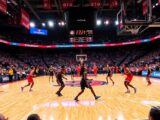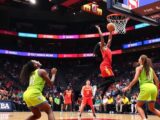
Mastering the Role of a Basketball Guard
December 10, 2024Mastering the role of a basketball guard involves sharpening your playmaking, defensive skills, and court awareness. You'll need exceptional ball handling and an understanding of offensive and defensive strategies to control the game tempo. Communicating effectively with teammates creates teamwork and boosts performance. A high basketball IQ helps you exploit mismatches, while your defensive tenacity disrupts opponents' plans. Focus on conditioning, agility, and consistent skill development to maintain an edge. By honing these aspects, you'll elevate your game and make a significant impact on your team's success and strategies as you continue to develop your skills.
Key Qualities of a Basketball Guard
As a basketball guard, you need to embody a unique blend of skills that set you apart on the court. Exceptional court vision allows you to anticipate plays and make quick decisions, directly influencing the game's flow.
You must master ball handling skills, ensuring precise dribbling and passing under pressure to maintain control during offensive plays. Racial integration in sports has broadened the representation of athletes, showcasing diverse styles and experiences that can enhance your gameplay and perspective on teamwork and strategy increased diversity in athletic representation.
Having a high basketball IQ is vital; it helps you recognize defensive schemes and exploit mismatches, optimizing your team's performance. You're not just a player; you're a strategist, making decisions that can turn the tide of the game.
Effective communication is essential, too. You need to foster team cohesion, ensuring that everyone is aligned and motivated throughout the game. Your leadership qualities shine through when you encourage teammates and direct the offense, creating a supportive environment.
Lastly, don't underestimate the importance of defensive tenacity. Your ability to pressure opponents, create turnovers, and disrupt their offensive strategies can be game-changing.
Essential Skills for Success
To succeed as a basketball guard, you need to master essential skills like ball handling and effective passing strategies.
These abilities not only help you navigate the court but also set up your teammates for scoring opportunities.
Moreover, understanding how to create mismatches and utilize your agility can greatly enhance your effectiveness on the court, as centers often draw defensive attention away from guards, providing better shooting opportunities for them the importance of centers.
Plus, developing solid defensive skills will make you a well-rounded player who can impact both ends of the game.
Ball Handling Techniques
Mastering ball handling techniques is essential for any basketball guard looking to excel on the court. Your dribbling skills set the foundation for your overall performance. You need to develop the ability to navigate through defensive players while maintaining control of the ball.
Here are some key practices to enhance your ball handling:
- Practice various dribbling techniques: Focus on crossovers, behind-the-back, and hesitation moves.
- Maintain control under pressure: Protect the ball with your body, keeping your head up to survey for passing opportunities.
- Incorporate drills: Use both stationary and dynamic drills to improve coordination and agility.
- Simulate game situations: Utilize cones or defenders during practice to enhance your ability to make accurate passes in tight spaces.
- Strengthen your weak hand: Consistent practice of weak-hand dribbling increases versatility, allowing you to drive and pass effectively with both hands.
Effective Passing Strategies
Passing effectively is a game-changer for basketball guards, as it directly influences your team's offensive flow. Accurate passing not only creates scoring opportunities but also boosts your assist-to-turnover ratio, a key metric for evaluating your contribution to the game.
Embrace various passing techniques like chest passes, bounce passes, and overhead passes to adapt to different defensive setups and teammate positions seamlessly.
While executing these passes, maintain a low dribble to protect the ball from defenders, enhancing your chances of successful distribution. Effective communication is essential in this process; using verbal cues and hand signals can greatly improve teamwork, ensuring everyone is aligned on play execution.
Moreover, reading the defense is vital. The best guards anticipate player movements, which allows for quicker, more effective passing decisions.
Spend extra time studying game footage to sharpen your ability to read defenses and improve your passing efficiency. By mastering these effective passing strategies, you'll not only elevate your own game but also maximize your team's potential on the court.
Defensive Skills Development
Defense is the backbone of a successful basketball team, and developing essential skills as a guard is crucial for making a significant impact on the game.
Focus on honing your defensive skills to excel in on-ball defense and contribute to your team's success. Here are key areas to concentrate on:
- Quick Lateral Movement: Improve your agility to stay in front of ball handlers.
- Anticipating Actions: Read the opponent's eyes and body language to predict plays.
- Maintaining Positioning: Use low and balanced stances to react quickly to offensive moves.
- Communicating Assignments: Foster teamwork by clearly conveying defensive strategies to your teammates.
- Creating Turnovers: Focus on intercepting passes and closing out on shooters without fouling.
Responsibilities of a Point Guard
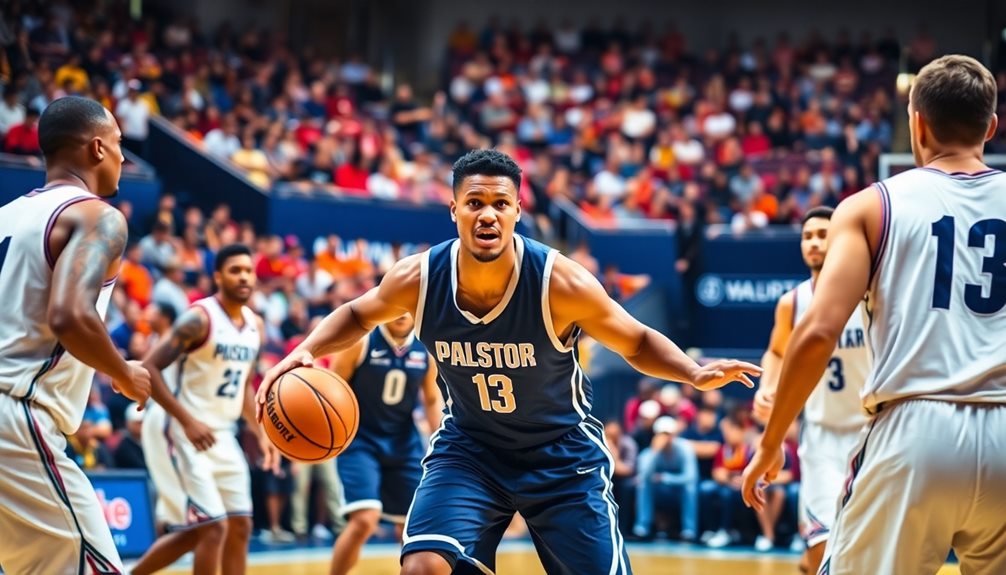
As you step onto the court, the role of a point guard becomes essential in controlling the game's flow. You're the one orchestrating the team's offense, ensuring that every player is in sync with the game strategies laid out by your coach. Your primary responsibility is to control the pace of the game, moving the ball up the court effectively, even under defensive pressure from the opposing team.
To enhance your skills, consider incorporating cardio workouts into your training routine, as they help improve both speed and endurance essential for your position.
You'll need to call plays that align with your game plan, guiding your teammates to execute them successfully. As you distribute the ball, your accuracy creates scoring opportunities, making you a pivotal player in the team's dynamics. Keeping your eyes up and scanning the court will help you identify the best passing options.
On the defensive end, your responsibilities don't stop. You'll guard the opposing point guard, aiming to disrupt their rhythm and create turnovers.
This dual role requires you to be agile, intelligent, and aware of both offensive and defensive plays. By mastering these responsibilities, you not only enhance your performance but also elevate your entire team's success on the court.
Offensive Contributions and Strategies
As a point guard, your main job is to create scoring opportunities for your team while ensuring the ball gets distributed strategically.
This role is further heightened by the shot clock, which necessitates swift, critical offensive decisions to optimize scoring chances. You need to balance your playmaking with your own scoring, which means being a threat from the perimeter.
Mastering these elements not only enhances your effectiveness but also keeps the offense dynamic and unpredictable, leading to a more thrilling gameplay experience impact on offensive strategy.
Creating Scoring Opportunities
Creating scoring opportunities is a crucial aspect of a basketball guard's role, and it starts with leveraging your court vision. By identifying and exploiting defensive weaknesses, you can create chances for your teammates through precise, timely passes.
Here are some key strategies to enhance your offensive contributions:
- Utilize Effective Ball Handling: Navigate through tight defenses, facilitating drives that lead to personal scoring or assists.
- Focus on Spacing: Create separation through player movement, maximizing high-percentage shot opportunities for yourself or teammates.
- Master the Pick-and-Roll: Execute this play to generate mismatches and open lanes, allowing for either a score or an assist.
- Develop a Well-Rounded Scoring Ability: Cultivate your shooting skills from mid-range and beyond the arc to keep defenses guessing.
- Timely Decision Making: Recognize when to shoot, pass, or drive, ensuring you capitalize on the best scoring opportunities.
Strategic Play Distribution
Strategic play distribution is essential for any basketball guard aiming to elevate their team's offensive performance. To achieve this, you need to recognize your teammates' strengths and positioning, creating ideal scoring opportunities. This awareness can lead to impressive assist averages, often surpassing 10 assists per game among elite players.
Utilizing your exceptional court vision lets you anticipate defensive movements, allowing for quick decisions that result in high-percentage shots for your teammates. This not only enhances their shooting percentages but also boosts overall offensive effectiveness.
Incorporating strategic ball movement techniques, like pick-and-rolls and off-ball screens, enables you to manipulate defenses, creating mismatches and open shots while maintaining the offensive rhythm.
Additionally, using advanced statistics such as assist-to-turnover ratio helps you evaluate your effectiveness in distributing the ball while minimizing mistakes; a 2:1 ratio is considered excellent.
Mastering the art of timing in your play distribution allows you to control the tempo of the game, maximizing scoring opportunities during fast breaks or half-court settings.
Ultimately, by honing these skills, you'll considerably contribute to your team's success on the court.
Balancing Playmaking and Scoring
Finding the right balance between playmaking and scoring is essential for any basketball guard looking to make a significant impact on the game. As a guard, you need to be both a reliable scoring threat and a facilitator. Top guards average around 20 points and 8 assists per game, showcasing the importance of mastering both aspects.
To excel in this dual role, focus on these key strategies:
- Understand Your Teammates: Know their strengths and weaknesses to create effective scoring opportunities.
- Prioritize Communication: Keep open lines with your teammates to identify mismatches and adjust strategies on the fly.
- Master Shot Selection: Assess when to make your move versus when to set up others for better shots.
- Utilize Deception: Use no-look passes and shot fakes to keep defenders guessing and create openings.
- Clutch Scoring: In tight situations, don't shy away from taking the final shot or orchestrating the winning play.
Defensive Duties and Techniques
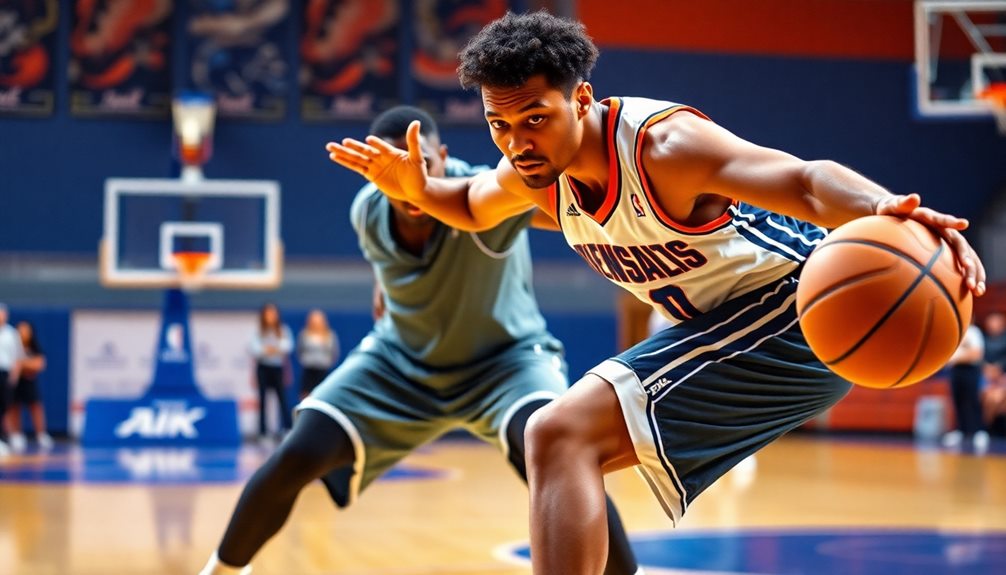
As a guard, your defensive duties are imperative to the team's success on the court. As a point guard, you're primarily responsible for guarding the opposing point guard. You need to apply pressure to disrupt their offensive rhythm and ball movement.
Effective on-ball defense requires you to maintain a low stance and use quick footwork to stay in front of your opponent, minimizing their ability to drive or create shots. Mastery of fundamentals, such as anticipation of opponent movements, will enhance your ability to position yourself effectively on the court.
Focus on anticipating passes and reading the offensive player's body language. This anticipation can help you create opportunities to steal the ball or force turnovers.
While doing this, you'll also need to be alert and ready to communicate with your teammates. Direct them to switch or help defend against screens and cuts.
Utilizing solid defensive techniques is essential. Close out on shooters effectively, contest shots without fouling, and always be aware of your positioning.
Importance of Communication
As a guard, effective on-court communication is your lifeline for success.
You need to build team cohesion through vocal and non-verbal signals, ensuring everyone's on the same page during critical plays.
Understanding tactical nuances can also enhance your ability to communicate effectively with teammates.
Effective On-Court Communication
Effective on-court communication is essential for any basketball team aiming to excel. As a guard, your role is significant in fostering effective communication that enhances team awareness and execution.
You need to use verbal cues and hand signals to keep your teammates informed about plays and strategies. Here are key aspects to focus on:
- Verbal Cues: Clearly announce plays to make sure everyone's on the same page.
- Defensive Assignments: Relay important information about who's guarding whom to minimize confusion.
- Spacing and Movement: Direct teammates on proper positioning to create scoring opportunities.
- Anticipating Opponents' Plays: Share insights about the enemy's tactics, allowing for quick defensive adjustments.
- Trust and Unity: Build a strong rapport with your teammates through consistent communication, fostering team spirit.
Building Team Cohesion
Building team cohesion hinges on clear communication and mutual understanding among players. As a point guard, you play an important role in fostering this environment. Your ability to communicate effectively with teammates not only directs plays but also builds trust. When you utilize verbal cues and hand signals, you guarantee everyone's on the same page, which is essential during high-pressure moments.
Encouraging open dialogue during practices and games is imperative. This allows you and your teammates to address mistakes, share insights, and adapt strategies in real-time. Constructive feedback can elevate both individual and team performance, making everyone feel valued and engaged.
Leading by example is also significant; when you demonstrate strong communication skills, your teammates are likely to follow suit.
Studies show that teams with high levels of communication experience better assists and lower turnover rates, underscoring the impact of cohesive communication on success.
Non-Verbal Signals Utilization
Clear communication goes beyond words; non-verbal signals play a pivotal role in a point guard's ability to direct the game. As you lead your team, utilizing these cues enhances your court vision and fosters teamwork. Non-verbal signals, like hand gestures and eye contact, allow you to communicate plays without tipping off the opposing team.
Here are key aspects of non-verbal communication for a point guard:
- Hand Signals: Develop specific gestures to call plays quickly and clearly.
- Eye Contact: Establish trust and understanding with teammates, signaling intent.
- Body Language: Use your posture and movement to convey urgency or confidence.
- Positioning: Adjust your placement on the court to indicate strategy shifts.
- Anticipation: Read your teammates' body language to react effectively during fast breaks.
Game Situational Awareness

Mastering game situational awareness is fundamental for a basketball guard, as it directly influences decision-making in high-pressure moments. You need a solid understanding of the game, which means recognizing the current score and time on the clock. This knowledge helps you make critical choices when the stakes are high.
For instance, effective clock management is key; a point guard must know when to speed up or slow down the pace based on the game's context. Additionally, just as the Mexico National Soccer Team has demonstrated their ability to adapt in high-stakes matches, a guard must also study the opposing team's strategies and adjust their gameplay accordingly, showcasing their regional dominance in tournaments.
Moreover, you must anticipate opponents' tactics, allowing you to make strategic adjustments that exploit their weaknesses. This anticipation enhances your ability to respond effectively during significant plays.
A point guard must also adapt their playing style according to teammates' strengths and weaknesses, ensuring everyone is on the same page offensively and defensively.
Building a strong relationship with your coach is another crucial element of game situational awareness. This connection keeps you aligned with the team's strategies and expectations, allowing you to make informed decisions on the court.
Control of Game Tempo
Controlling the tempo of a basketball game is essential for a point guard, as it directly influences the overall flow and effectiveness of your team's offense. By mastering this aspect, you can gain a strategic advantage that allows you to dictate the pace of play.
You need to recognize when to speed up or slow down the game, making quick decisions that can change the course of play.
Here are some key strategies for effective tempo control:
- Push the ball after a defensive rebound to exploit fast-break opportunities.
- Read the defense to determine whether to initiate a fast break or set up a half-court offense.
- Utilize ball screens and strategic dribbling to manipulate the game's pace.
- Communicate with teammates to guarantee everyone is on the same page regarding spacing and crashing the boards.
- Adjust tempo based on your team's strengths to create higher-quality scoring chances while minimizing turnovers.
Scoring Techniques and Finishing
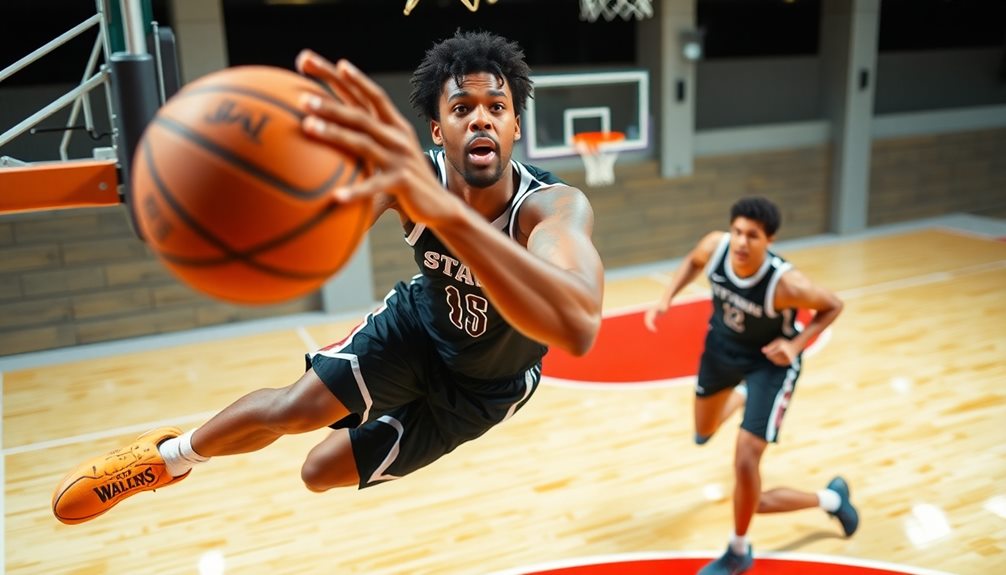
As you gain control over the tempo of the game, it's equally important to sharpen your scoring techniques and finishing skills. To create scoring opportunities in the paint, focus on attacking seams in the defense. This approach not only opens up lanes for high-percentage shots but also gives you a chance to draw fouls for free-throw opportunities.
Incorporating cardio training into your routine can enhance your stamina, allowing you to maintain high energy levels throughout the game.
Utilize techniques like jump stops and shot fakes to navigate around defenders, enhancing your finishing opportunities at the basket. Remember, maintaining composure under pressure is vital, especially during those critical game moments. When you keep your cool, you're more likely to convert tough plays into points.
Master various fakes and no-look passes to keep defenders off-balance, creating scoring options for both you and your teammates. Additionally, developing your shooting skills from long range greatly boosts your offensive threat.
This versatility makes you a dual scoring and playmaking option for your team, allowing you to capitalize on any defensive misstep. By honing these techniques, you'll elevate your game and become an integral part of your team's success.
Conditioning and Skill Development
To excel as a basketball guard, focusing on your conditioning and skill development is essential. You need to maintain excellent physical fitness to keep up with the fast pace of the game. This involves endurance training, agility drills, and strength workouts.
Incorporating endurance training methods will help enhance your stamina and meet the physical demands of the sport. Here are some key areas to concentrate on:
- Endurance Training: Incorporate running and interval workouts to enhance your stamina.
- Agility Drills: Use agility ladders and plyometric exercises to improve your speed and quickness.
- Footwork Practice: Engage in defensive slides and footwork drills to effectively defend against opponents.
- Ball Handling Skills: Develop a structured routine focusing on ball handling, passing, shooting, and defensive techniques.
- Strength Training: Prioritize lower body strength to gain power and stability during games.
Conclusion
In the beautiful game of basketball, embracing the role of a guard is more than just a position; it's a chance to shine. By honing your skills and understanding your responsibilities, you're not just playing a game—you're crafting moments that can change the course of a match. So, as you step onto the court, remember that every dribble, every pass, and every shot is a brushstroke on the canvas of the game. Make it unforgettable.

